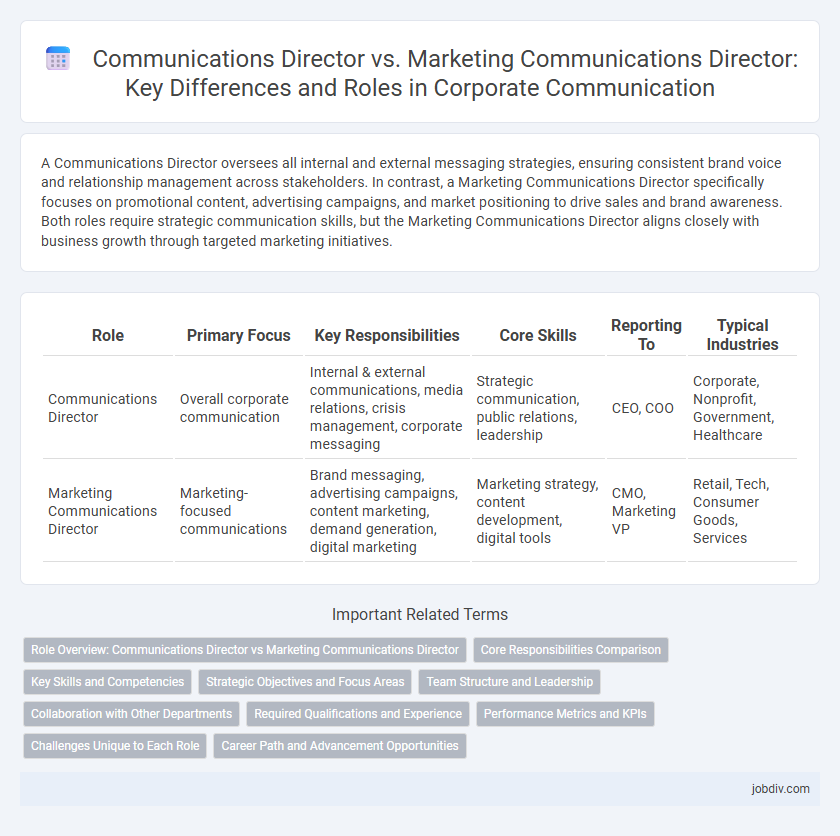A Communications Director oversees all internal and external messaging strategies, ensuring consistent brand voice and relationship management across stakeholders. In contrast, a Marketing Communications Director specifically focuses on promotional content, advertising campaigns, and market positioning to drive sales and brand awareness. Both roles require strategic communication skills, but the Marketing Communications Director aligns closely with business growth through targeted marketing initiatives.
Table of Comparison
| Role | Primary Focus | Key Responsibilities | Core Skills | Reporting To | Typical Industries |
|---|---|---|---|---|---|
| Communications Director | Overall corporate communication | Internal & external communications, media relations, crisis management, corporate messaging | Strategic communication, public relations, leadership | CEO, COO | Corporate, Nonprofit, Government, Healthcare |
| Marketing Communications Director | Marketing-focused communications | Brand messaging, advertising campaigns, content marketing, demand generation, digital marketing | Marketing strategy, content development, digital tools | CMO, Marketing VP | Retail, Tech, Consumer Goods, Services |
Role Overview: Communications Director vs Marketing Communications Director
A Communications Director oversees the company's overall internal and external communication strategies, managing public relations, media relations, and corporate messaging to maintain a consistent brand voice. In contrast, a Marketing Communications Director focuses specifically on promoting products or services through targeted marketing campaigns, advertising, and content creation to drive customer engagement and sales. Both roles require strategic planning, but the Communications Director operates broadly across all communication channels, while the Marketing Communications Director specializes in channels that directly support marketing objectives.
Core Responsibilities Comparison
A Communications Director primarily manages internal and external communications strategies, brand messaging, and media relations to enhance corporate reputation. In contrast, a Marketing Communications Director focuses on developing and executing promotional campaigns, advertising strategies, and market research to drive product sales and customer engagement. Both roles require strategic storytelling but differ in targeting audiences and measuring success through brand visibility versus sales metrics.
Key Skills and Competencies
A Communications Director excels in strategic messaging, media relations, and stakeholder engagement, ensuring consistent brand voice across all channels. A Marketing Communications Director specializes in campaign development, market analysis, and content creation to drive customer acquisition and retention. Both roles require strong leadership, excellent writing, and project management skills, but the Communications Director typically focuses on corporate reputation while the Marketing Communications Director prioritizes market-driven promotional strategies.
Strategic Objectives and Focus Areas
A Communications Director primarily oversees corporate communications, public relations, and internal messaging to align with overall strategic objectives of reputation management and stakeholder engagement. In contrast, a Marketing Communications Director focuses on promoting products or services through targeted campaigns, brand positioning, and customer outreach to drive sales and market growth. While both roles emphasize collaboration and messaging consistency, the Communications Director centers on corporate narrative and crisis communication, whereas the Marketing Communications Director prioritizes market segmentation and promotional strategies.
Team Structure and Leadership
A Communications Director oversees the entire communications strategy, managing teams across public relations, internal communications, and media relations to ensure consistent messaging. A Marketing Communications Director specifically leads teams focused on promotional content, brand messaging, and campaign execution, aligning closely with marketing objectives. Leadership in a Communications Director role requires broader cross-functional collaboration, while the Marketing Communications Director steers specialized marketing communication professionals for targeted audience engagement.
Collaboration with Other Departments
A Communications Director oversees company-wide messaging and works closely with public relations, human resources, and executive teams to align internal and external communications strategies. The Marketing Communications Director collaborates primarily with sales, product development, and digital marketing departments to create targeted campaigns that drive customer engagement and brand awareness. Both roles require cross-departmental coordination but differ in their focus areas--broad organizational communication versus market-driven promotional strategies.
Required Qualifications and Experience
A Communications Director typically requires extensive experience in corporate communications, public relations, and media management, often holding a bachelor's or master's degree in communications, journalism, or public relations. In contrast, a Marketing Communications Director demands expertise in marketing strategy, brand management, digital marketing, and content development, with qualifications including degrees in marketing, business administration, or communications. Both roles benefit from strong leadership skills, strategic planning abilities, and proficiency in analytics tools, but the Marketing Communications Director places greater emphasis on marketing campaign execution and consumer engagement metrics.
Performance Metrics and KPIs
Communications Directors prioritize metrics such as media reach, message penetration, and stakeholder engagement to gauge the effectiveness of corporate communications. Marketing Communications Directors focus on KPIs like lead generation, conversion rates, customer acquisition cost, and ROI to measure campaign impact and brand positioning. Tracking audience sentiment analysis and channel-specific engagement rates is crucial for both roles to refine strategies and drive organizational success.
Challenges Unique to Each Role
Communications Directors often face the challenge of managing organizational reputation and crisis communication while ensuring consistent messaging across all departments. Marketing Communications Directors must align promotional strategies with brand positioning and market trends, balancing creative campaigns with measurable ROI. Both roles require navigating complex stakeholder expectations, but Communications Directors prioritize internal and external trust-building, whereas Marketing Communications Directors focus on driving customer engagement and sales growth.
Career Path and Advancement Opportunities
A Communications Director typically oversees all corporate communication strategies, including public relations, internal communication, and media relations, positioning them for executive roles such as Chief Communications Officer. A Marketing Communications Director specializes in brand messaging and promotional campaigns, offering advancement toward senior marketing leadership roles like Vice President of Marketing. Career growth in both paths depends on developing strategic communication skills, leadership experience, and industry expertise.
Communications Director vs Marketing Communications Director Infographic

 jobdiv.com
jobdiv.com